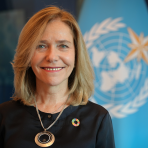Statement by Prof. Celeste Saulo, WMO Secretary-General, on the occasion of the Meteorological Forum of 2025 World Artificial Intelligence Conference
Your excellency, Dr CHEN Zhenlin, Administrator of CMA,
Your Excellency, Mr ZHANG Xiaohong, Vice Mayor Shanghai,
Dear Colleagues, Ladies and gentlemen,
As our planet becomes hotter and hotter, weather patterns shift and extremes multiply. Almost every day, another climate record is broken. Almost every week, another community is devastated. The water supply, the food chain, energy systems, public health—everything is under growing threat. And yet, the warnings that can save lives too often arrive too late, or not at all.
Science is more essential than ever before to protect our society and our economies.
WMO is therefore proud to co-host the Meteorological Forum at the 2025 World Artificial Intelligence Conference. I warmly thank the China Meteorological Administration and the Shanghai Municipal Government for their leadership in organizing this timely and important gathering. With its focus on “AI Empowering Early Warnings for All,” this forum speaks to the urgency—and the opportunity—before us.
China’s integrated early warning approach is a model of best practice. It combines government leadership, early warning first, cross-department collaboration and social engagement.
Guided by the principle of "people first, life first", this mechanism has demonstrated precise forecasting and seamless coordination. We saw this earlier this month when Typhoon Wipha battered China’s southern coast.
My message today is simple. We must harness the power of prediction. We must mainstream AI-powered weather and climate intelligence into every early warning and decision-making system—because lives depend on it.
Over 90% of all disasters are weather, climate and water-related. And yet, as extremes escalate, many regions still lack access to the basic tools of anticipation. At WMO, we’ve seen the difference innovation makes. When we piloted AI for flood forecasting in Nigeria, Viet Nam, Uruguay, and the Czech Republic—we detected early signals that could have otherwise been missed.
When AI helps rescue fading climate records or fill data gaps, it doesn’t just improve forecasts—it preserves memory and sharpens foresight.
That’s why we’re investing in inclusive innovation. We’re helping Regional Climate Centres in Africa, the Caribbean, and the Pacific apply AI to sub-seasonal forecasting. We are testing AI powered nowcasting applications alongside with the private sector on 3 continents, including here in Asia, our Regional Association II. We are helping explore the deployment of AI weather predictions in data sparse areas. We’re working with national partners to improve renewable energy forecasting in Latin America. And we proudly support the AIM for Scale programme, delivering tailored AI-powered services to smallholder farmers in 30 countries by 2027.
At the 79th session of the WMO Executive Council last month, we adopted a bold AI Action Plan to guide this transformation—anchored in scientific integrity and equity. A new Joint Advisory Group will steer our efforts to responsibly scale AI across infrastructure and research. But we are realistic: AI still faces limitations, especially for local high-impact events. These must be addressed before deployment.
To that end, we have launched several pilot initiatives—from AI for Nowcasting to tropical cyclone analysis in partnership with our long-standing collaborator the Economic and Social Commission for Asia-Pacific, as well as the AI Weather Quest with the European Centre for Medium Range Weather Forecasting.
Moreover, we are working with our partner ITU, global lead of EW4All Pillar 3, and many other international partners in an AI Sub-Group on Early Warnings for All, and on Global Initiative on Resilience to Natural Hazards through AI Solutions.
I would like to express my sincere thanks to the China Meteorological Administration, the Regional Training Centre it hosts, and the Shanghai Meteorological Service for organizing last month’s AI Empowered Early Warnings for All training course, which welcomed participants from 21 countries. I also commend CMA’s decision to launch the MAZU Initiative in response to the Early Warnings for All call, and its expressed readiness to establish a Centre on Urban Multi-Hazard Early Warnings in Shanghai.
Looking ahead, WMO will convene its first AI Strategic Conference this September in Abu Dhabi. Then, in October, our Extraordinary Congress will chart the course toward AI-integrated global forecasting systems.
Let us ensure AI becomes not a barrier but a bridge—not a luxury for some, but a lifeline for all. Let us be remembered not for having the tools and failing to use them, but for acting—together, and in time.
Thank you.
Statement by


